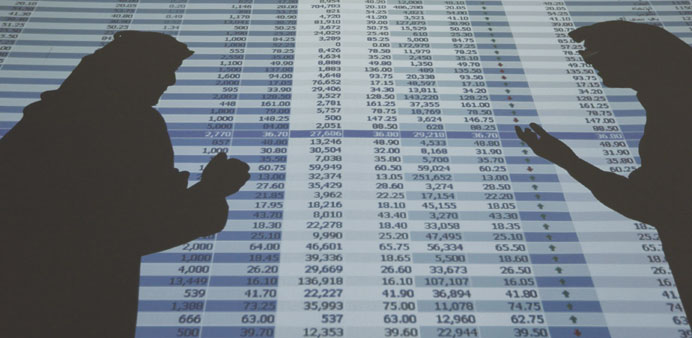The shadows of investors are seen cast on a screen as they monitor stock prices at the Falcom investment bank in Riyadh. The main Saudi index rose 4.0% yesterday, its biggest gain this year, to 9,620 points on its highest volume in 11 months.
Reuters/Dubai
Saudi Arabia’s bourse surged yesterday after the kingdom’s securities regulator said it would open the market to direct foreign investment from June 15, while many other markets in the Middle East were weak.
The main Saudi index rose 4.0%, its biggest gain this year, to 9,620 points on its highest volume in 11 months. It broke minor technical resistance at the late March high of 9,377 points and stood above the 200-day average, now at 9,572 points.
It has not stayed above the average on a sustained basis since last November; a clean break above it would be longer-term bullish technically.
The kingdom announced last July that it would permit direct foreign purchases of shares in the first half of 2015, as a way to expose companies to market discipline, diversify the economy beyond oil and create jobs.
The Capital Market Authority announced after the close on Thursday that qualified foreign institutions would be able buy shares from mid-June and that the final rules covering this would be published on May 4. Up to now, foreigners have been restricted to buying Saudi shares indirectly through swaps or exchange-traded funds.
Fresh fund flows into Saudi Arabia in the initial months may be moderate - perhaps only hundreds of millions of dollars a month - partly because share valuations are currently quite high. Saudi Arabia’s forward price-to-earnings ratio of 16.2 is on a par with those of the Dow Jones Industrial Average and FTSE 100, and well above other Gulf markets.
But the announcement nevertheless buoyed investor sentiment, as the market opening is likely to start the process of incorporating Saudi Arabia into major equity indexes such as those run by MSCI, which will eventually attract tens of billions of dollars.
Saudi Basic Industries Corp (Sabic), which is expected to be a major target of foreign investors as the country’s biggest listed firm, surged its daily 10% limit yesterday. It reported a 39% drop in first-quarter net income yesterday that was not as large a fall as analysts had forecast.
Shares in several other petrochemical firms such as Saudi Kayan, Yanbu National and Saudi Industrial Investment Group also rose their daily 10% limits on Sunday.
Banking heavyweights Al Rajhi and National Commercial Bank jumped 3.7% and 3.4% respectively.
Several other Gulf markets fell as the UAE and Qatar pulled back after a few strong sessions. Dubai’s index fell 1.4% after surging 8.1% in the three previous sessions, though property developer Damac extended gains in its highest daily trading volume on record.
The stock, which listed in Dubai in January, surged as much as 7.2% during the day, hitting a new all-time high of 3.11 dirhams. But it gave up most of those gains and closed just 2.1% higher at 2.96 dirhams.
Damac’s board will discuss the company’s dividend distribution policy, along with first-quarter results, at a meeting on April 21. The firm paid no cash dividend for 2014 but issued bonus shares.
Abu Dhabi and Qatar edged down 0.7% each in broad declines. Kuwait added 0.7% and Oman’s bourse inched up 0.05%.
Some Gulf investors may be cashing out of the UAE and Qatar in order to invest in Saudi Arabia’s bourse. According to Doha bourse data, for instance, Gulf investors sold almost twice as many stocks as they bought yesterday.
Unlike other foreigners, Gulf investors can already trade Saudi stocks freely, so they may try to profit from front-running foreigners, as they did in the UAE and Qatar last year when the two countries were upgraded to emerging market status by major index compilers.
Egypt’s bourse fell 1.4% and Juhayna Food Industries was the biggest loser, tumbling 5.4%. Egypt is considering a 20% tariff on white sugar imports as it bolsters its own sugar industry with a subsidised export push, a ministerial statement and a filing at the World Trade Organisation said on Thursday.
In the short term at least, the move would probably hurt local food makers which use sugar as a key ingredient.
Most other Egyptian stocks were also weak but El Arabia For Investment & Development rose 6.5% after last Thursday asking its shareholders to approve the sale of its subsidiary Cairo for Development and Car Manufacturing to a strategic investor at a meeting on April 25. It did not disclose the price of the potential deal.
According to Prime Holding brokerage, the unit is the exclusive agent for the Peugeot car brand in Egypt.
Elsewhere in the Gulf, Kuwait’s index climbed 0.7% to 6,337 points; Oman’s index added 0.3% to 6,290 points, while Bahrain’s index slipped 0.2% to 1,392 points.

